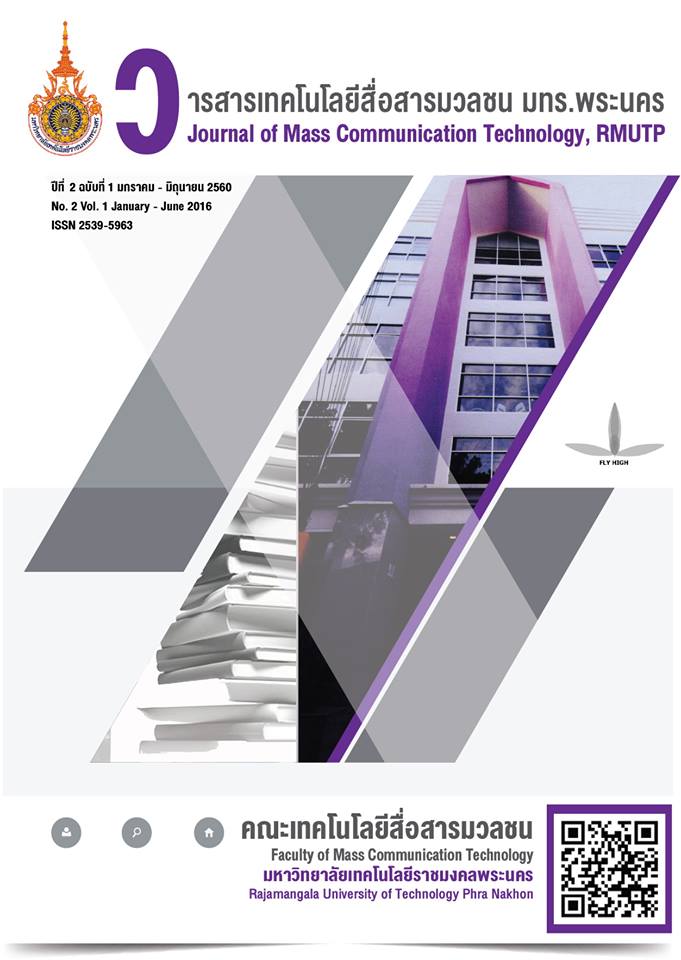Why Generation Z’ Digital Literacy can be Improved through Digital Storytelling? Purita Sayavaranont and Panita Wannapiroon
คำสำคัญ:
Generation Z, Digital Literacy, Industry 4.0, 21st Century Skills, Skills for Future Workforce, Digital Storytellingบทคัดย่อ
This article addresses the impact of the rapid development of disruptive technologies which will impact every life in an unimaginable way. While impacts of these disruptive have been felt, causing the emerging of new business models such as net jobs and the sharing economy. In addition to this, the skill disruption within an occupation has also shifted in a meaningful way e.g. new job categories and new required skill sets for future business are invented. In order to overcome these challenges effectively, supporting current work force through re-training and adequate planning for future workforces, generation Z, to become better prepared and fully equipped with digital knowledge, i.e. digital literacy, would be a good strategy. Digital storytelling can support Generation Z and their learning of digital literacy by familiarizing with computers, utilizing different multimedia formats and combining them to create something meaningful which are a sample of digital literacy’s desired outcome.
เอกสารอ้างอิง
Code.org. (2017). Promote Computer Science. Available from : https://code.org/promote
Local Tech News. (1 November 2016). [serial online]. Industries embrace digital innovation. Business section. Bangkok Post. Available from : http://www.bangkokpost.com/tech/local-news/1124057/industries-embrace-digital- innovation
Kasichainula, S. (26 January 2017). [serial online] “Understanding the Journey to Digital Thailand.” The Nation.
Available from : http://www.nationmultimedia.com/news/opinion/30304913
Kingston, A. (2014). Get ready for Generation Z – They’re smarter than Boomers, and way more ambitious than
the Millennials. McClean’s. Available from : www.macleans.ca/society/life/get-ready-for-generation-z/
McCrindle. (2015). Gen Z and Gen Alpha info Graphic Update. Available from : http://mccrindle.com.au/
the-mccrindle-blog/gen-z-and-gen-alpha-infographic-update
McCrindle. (2016). Generation Z Defined; The 5 Characteristics of Today’s Students. McCrindle. Available from : http://mccrindle.com.au/the-mccrindle-blog/tag/gen_z/
McKinsey & Company. (2015). Industry 4.0 How to navigate digitization of the manufacturing sector. Available from : http://www.mckinsey.com/business-functions/operations/our-insights/industry-four-point-o-how-to-navigae-the-digitization-of-the-manufacturing-sector
Meadows, D. (2003). “Digital storytelling : Research-based practice in new media.” Visual Communications. Vol. 2 : 189-193
Mendosa, M. (2015). The Evolution of Storytelling. Available from : http://reporter.rit.edu/tech/evolution-storytelling.
Miller, E. (2009). Digital Storytelling in Department of Curriculum and Instruction. Available from : https://icss.uni.edu/researchhelps/miller.pdf
Morra, S. (2014). 8 Steps to Great Digital Storytelling. Available from : http://www.edudemic.com/8stepstogreatdigitalstorytelling/
OECD/UNESCO. (2016). Education in Thailand: An OECD-UNESCO Perspective. Reviews of National Policies for Education, OECD Publishing, Paris. Available from : http://dx.doi.org/10.1787/9789264259119-en
Ohler, J. (2008). Digital storytelling in the classroom. Thousand Oaks, CA : Corwin Press.
Parker, P. (2013). [serial online] “Do you know how Generation Z pupils learn?.” SecEd. Available from : http://www.sec-ed.co.uk/blog/do-you-know-how-generation-z-pupils-learn/
Partnership for 21st Century Learning (2015). Framework for 21st Century Learning. Available from : http://www.p21.org/storage/documents/docs/P21_Framework_Definitions_New_Logo_2015.pdf
Pooparadai, K. (2016). Digital Economy Development Plan. Available from : http://www.mict.go.th/assets/portals/1/files/590613_1DE_27-5-59-Dr.kasititorn.pdf
Puncreobutr, V. (2016). [serial online] “Education 4.0: New Challenge of Learning.” St. Theresa Journal of Humanities and Social Sciences, 2. Available from : http://www.stic.ac.th/ojs/index.php/sjhs/article/view/Position%20Paper3/47Robin, B. (2017). What is Digital Storytelling?. Available from : http://digitalstorytelling.coe.uh.edu/page.cfm?id=27&cid=27
Robin, B. (2008). The effective uses of digital storytelling as a teaching and learning tool. In J. Flood, S. Health, & D. Lapp (Eds.), Handbook of Research on Teaching Literacy through the Communicative and Visual Arts (2) (pp. 429-440). New York : Lawrence Erlbaum Associates.
Smeda, N., Dakich, E. and Sharda, N., (2014). The Effective of Digital Storytelling in the Classroom : A Comprehensive Study. DOI 10.1186/s40561-014-0006-3
UNESCO. (2003). Report on Activities Related to the Five Areas of the Information for All Programme. Report on the Intergovernmental Council for the Information for All Programme Meeting, Paris, France., 22-24 April 2003.
UNESCO. (2004). Role and Focus of the Intergovernmental Council for the Information for All Programme. Paper presented at the Intergovernmental Council for the Information for All Programme Meeting, Paris, France., 4-6 May 2004.
UNESCO (2011). Digital Literacy in Education, Policy Brief. Institute for Information Technologies in Education Policy Brief. Available from : http://unesdoc.unesco.org/images/0021/002144/214485e.pdf
World Economic Forum. (2015). The Global Competitiveness Report: 2015-2016. Available from : http://www3.weforum.org/docs/gcr/2015-2016/Global_Competitiveness_Report_2015-2016.pdf
ดาวน์โหลด
เผยแพร่แล้ว
รูปแบบการอ้างอิง
ฉบับ
ประเภทบทความ
สัญญาอนุญาต
Copyright (c) วารสารเทคโนโลยีสื่อสารมวลชน มทร.พระนคร
วารสารเทคโนโลยีสื่อสารมวลชน มทร.พระนคร อยู่ภายใต้การอนุญาต Creative Commons Attribution-NonCommercial-NoDerivatives 4.0 International License. (CC BY-Nc-ND 4.0) เว้นแต่จะระบุไว้เป็นอย่างอื่น โปรดอ่านหน้านโยบายของเราสำหรับข้อมูลเพิ่มเติมเกี่ยวกับการเข้าถึงแบบปิด ลิขสิทธิ์ และการอนุญาต




